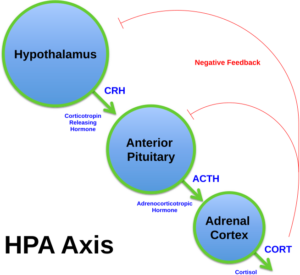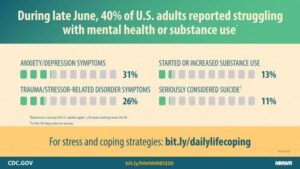High Cortisol Levels: Causes, Symptoms & Natural Treatment Guide
You’re tired but wired. You can’t sleep, yet you wake up exhausted. Your waistline is expanding no matter what you do. Sound familiar?
These aren’t just random annoyances. They’re signs your cortisol levels might be out of whack. When your stress hormone stays elevated, your whole body pays the price.
What Is Cortisol and Why Does It Matter?


Think of cortisol as your body’s built-in alarm system. Your adrenal glands (small glands sitting on top of your kidneys) make this hormone. Then they release it into your bloodstream when you’re stressed.
Cortisol isn’t bad. Actually, you need it to survive. It helps you wake up, gives you energy during the day, and lowers at night so you can sleep.
How Your Body Makes Cortisol
Your brain and adrenal glands work together through something called the HPA axis. This stands for hypothalamic-pituitary-adrenal axis—basically your body’s stress control center.
Here’s how it works. When your brain senses stress, your hypothalamus releases a hormone that tells your pituitary gland to act. Next, your pituitary sends another signal to your adrenal glands. Then your adrenals pump out cortisol.

The Cortisol Production Pathway:
Normally, cortisol levels drop once the stressor passes. But when you’re constantly stressed, this system stays “on.” That’s when problems start.
Common Symptoms of High Cortisol Levels
So how do you know if your cortisol is too high? High cortisol causes symptoms that affect your whole body. But many people don’t realize cortisol is the culprit.
These symptoms often mimic other conditions. That’s why it’s easy to miss the connection.
Can’t fall asleep despite feeling exhausted. You might also wake up at 3 a.m. with racing thoughts.
Especially around your belly. Cortisol triggers fat storage in your midsection even when you eat well.
Trouble focusing or remembering things. Your thoughts feel fuzzy and scattered throughout the day.
Small things set you off. You feel on edge, nervous, or overwhelmed more often than normal.
Your immune system weakens. So you catch every cold that comes around your office or home.
Your muscles feel tired and achy. Even simple tasks seem harder than they should be.
Cortisol can raise your blood pressure over time. This increases your risk of heart problems.
You go from fine to furious quickly. Depression and emotional ups and downs become common.
Notice several of these symptoms? It’s worth talking to your doctor. They can test your cortisol levels through blood, saliva, or urine samples.
What Causes High Cortisol Levels?
High cortisol doesn’t just happen randomly. Several things can push your levels too high. Let’s look at the most common causes.

Chronic Stress (The Biggest Culprit)
When stress becomes constant, your body stays in fight-or-flight mode. This keeps cortisol elevated day after day. Work pressure, relationship problems, financial worries—they all keep your stress response activated.
Here’s the problem. Your body doesn’t know the difference between a real threat and modern stress. Whether you’re being chased by a bear or stressing about emails, your stress response is the same.

Poor Sleep Quality
Sleep deprivation causes your body to pump out more cortisol during the day. But then high cortisol makes it harder to sleep at night. You see how this becomes a problem.
Cortisol should be lowest at midnight. It naturally rises around 2-3 a.m., then peaks about 30 minutes after you wake up. When you don’t sleep well, this rhythm gets disrupted.
Medical Conditions
Sometimes high cortisol comes from a medical problem. Cushing syndrome happens when your body makes too much cortisol for a long time. This can result from tumors on your pituitary or adrenal glands.
Polycystic ovary syndrome (PCOS) can also affect cortisol. So can certain medications, especially steroid drugs like prednisone.
| Cause Category | Examples | How It Affects Cortisol |
|---|---|---|
| Lifestyle Factors | Chronic stress, poor sleep, too much caffeine | Keeps cortisol elevated throughout the day |
| Medical Conditions | Cushing syndrome, PCOS, adrenal tumors | Causes excessive cortisol production |
| Medications | Prednisone, dexamethasone, other steroids | Directly increases cortisol in your body |
| Diet Issues | High sugar, processed foods, excessive caffeine | Triggers cortisol spikes and blood sugar swings |
The Stress-Cortisol Connection
Let’s talk about stress. Because understanding this relationship is crucial for managing your cortisol levels.
Your stress response evolved to save your life. When you face danger, cortisol floods your system. It increases your heart rate, raises blood pressure, and releases glucose for quick energy.
This is perfect for escaping danger. But terrible for dealing with daily stress.
Acute Stress vs. Chronic Stress
Acute stress is short-term. You give a presentation, cortisol rises, then it drops when you’re done. This is healthy and normal.
Chronic stress is different. It never stops. Your cortisol stays elevated week after week, month after month. This wears down your body like running a car engine at full speed constantly.
How Chronic Stress Damages Your Health:
Research shows chronic stress and high cortisol are linked to neurodegenerative diseases. This includes Alzheimer’s and Parkinson’s disease. The connection involves inflammation and damage to brain cells.
Natural Ways to Lower Cortisol Levels
Here’s the good news. You can lower cortisol naturally without medication in most cases. These evidence-based strategies really work. But you need to be consistent.
Your Cortisol-Lowering Action Plan
Aim for 7-9 hours nightly. Keep a consistent sleep schedule, even on weekends. Make your bedroom cool (65-68°F), dark, and quiet. Avoid screens for at least an hour before bed.
Deep breathing, meditation, and yoga can significantly lower cortisol. Even 10-20 minutes daily makes a difference. Try box breathing: inhale for 4 counts, hold for 4, exhale for 4, hold for 4.
Exercise helps regulate cortisol levels. But don’t overdo it—too much intense exercise can raise cortisol. Aim for 150-200 minutes of moderate activity weekly. Walking, swimming, or cycling all work great.
Focus on whole foods. Include plenty of vegetables, fruits, healthy fats, and protein. Foods high in omega-3s, magnesium, and fiber help keep cortisol stable. Limit added sugar and processed foods.
Coffee can spike cortisol, especially in the afternoon. Try limiting yourself to one cup in the morning. Or switch to green tea, which contains L-theanine that promotes calm.
Social connection is a powerful stress buffer. Spend quality time with friends and family. Even a 10-minute phone call with someone you trust can lower cortisol.
Foods That Help Lower Cortisol
What you eat matters. An anti-inflammatory diet helps keep cortisol in check. Here are the best foods to include.
Fatty Fish
Salmon, sardines, and mackerel are rich in omega-3s. These healthy fats reduce inflammation and support healthy cortisol patterns.
Foods High in Magnesium
Avocados, dark chocolate, spinach, and almonds. Magnesium helps regulate your stress response and promotes relaxation.
Colorful Vegetables & Berries
Packed with antioxidants that fight inflammation. Blueberries, strawberries, leafy greens, and peppers are excellent choices.
Probiotic-Rich Foods
Greek yogurt, kefir, and sauerkraut support gut health. A healthy gut helps regulate cortisol through the gut-brain axis.
Supplements That May Help
Some supplements show promise for lowering cortisol. But always talk to your doctor before starting any new supplement.
🌿 Evidence-Based Supplements:
- Ashwagandha: This adaptogenic herb may reduce cortisol levels by up to 30% in some studies.
- Magnesium glycinate: Better absorbed than other forms. Helps with sleep and stress management.
- Omega-3 fish oil: Supports brain health and helps regulate cortisol response to stress.
- Rhodiola rosea: Another adaptogen that may help your body handle stress better.
Remember, supplements work best alongside lifestyle changes. They’re not magic pills. Think of them as support for the other healthy habits you’re building.
Creating Your Daily Cortisol-Balancing Routine
Knowing what to do isn’t enough. You need a plan. Here’s a simple daily routine that supports healthy cortisol levels.
Morning Routine (Supporting Healthy Cortisol Rise):
→ Wake up at the same time daily, even on weekends
→ Get sunlight within 30 minutes of waking (boosts mood, regulates rhythm)
→ Drink water before coffee (rehydrate first)
→ Eat a protein-rich breakfast (stabilizes blood sugar)
→ Do 5-10 minutes of gentle stretching or movement
Evening Routine (Promoting Cortisol Decline):
→ Dim lights 1-2 hours before bed
→ Turn off screens by 9 p.m. (or at least use blue light filters)
→ Take a warm bath or shower (drops body temperature, signals sleep time)
→ Practice relaxation: deep breathing, meditation, or gentle yoga
→ Go to bed at the same time every night
Start with just one or two changes. Then add more as these become habits. Small, consistent actions create big results over time.
How Long Does It Take to Lower Cortisol?
You’re probably wondering when you’ll feel better. The honest answer? It depends.
Some changes work quickly. Deep breathing can lower cortisol within minutes. A good night’s sleep helps the next day. But reversing chronic high cortisol takes weeks or months.
Be patient with yourself. Your body needs time to heal and reset. Focus on progress, not perfection.
When to Seek Medical Help
Sometimes lifestyle changes aren’t enough. You might need medical treatment if you have certain conditions.
See your doctor if you experience:
- Rapid, unexplained weight gain (especially in your face and upper back)
- Purple stretch marks on your skin
- Severe muscle weakness
- Bone fractures without major injury
- High blood pressure that’s hard to control
- Persistent symptoms despite lifestyle changes
These could indicate Cushing syndrome or another serious condition. Your doctor can run tests and provide appropriate treatment. This might include medication, surgery, or other medical interventions.
Final Thoughts: Taking Control of Your Cortisol
High cortisol levels affect millions of people. But you’re not powerless. By understanding what causes elevated cortisol and taking action, you can restore balance.
The path forward is clear. Prioritize sleep. Manage stress daily. Eat nutritious foods. Move your body regularly. Build strong relationships. These aren’t just cortisol-lowering strategies—they’re foundations for optimal wellness in every area of your life.
Start small. Pick one strategy from this guide. Master it. Then add another. Over time, these small changes compound into life-changing results.
Your future self—calmer, healthier, and more energized—will thank you for starting today.
References
- Cortisol: What It Is, Function, Symptoms & Levels – Cleveland Clinic
- Physiology, Cortisol – StatPearls – NCBI Bookshelf
- High Cortisol Levels: Symptoms, Causes, and More – Healthline
- Chronic stress puts your health at risk – Mayo Clinic
- Cushing Syndrome: Causes, Symptoms & Treatment – Cleveland Clinic
- Cortisol and Sleep: Can It Cause Insomnia? – Healthline
- Understanding the stress response – Harvard Health
- The Role of Cortisol in Chronic Stress, Neurodegenerative Diseases – PMC
- 11 Natural Ways to Lower Your Cortisol Levels – Healthline
- 13 Natural Ways to Lower Your Cortisol Levels – Medical News Today
- How To Lower Cortisol and Reduce Stress – Cleveland Clinic
- Cortisol dysregulation: link between stress, depression, and type 2 diabetes – PMC
Related Articles on Remedy Verified
Continue your wellness journey with these evidence-based resources:
Author Bio
The Remedy Verified Team translates complex metabolic science into clear, practical strategies for everyday health.
Medical Disclaimer
This article provides general information and should not replace professional medical advice, diagnosis, or treatment. Always consult qualified healthcare providers before making significant changes to your diet, exercise routine, supplement regimen, or lifestyle. Individual health needs vary, and what works for one person may not be appropriate for another. If you have chronic health conditions, take medications, or are pregnant or nursing, speak with your healthcare provider before implementing new wellness practices.



